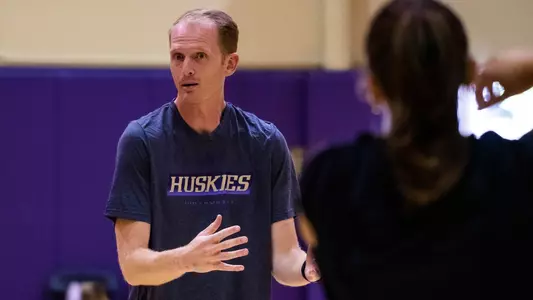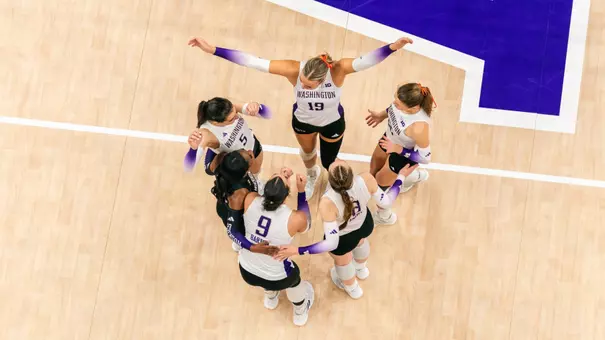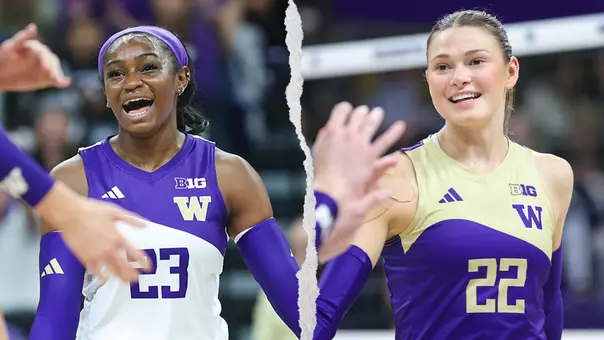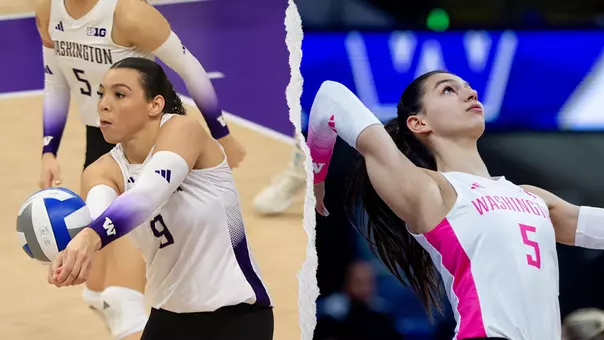
Meet Coach Wooldridge
September 20, 2023 | Volleyball
Washington's new-look coaching staff in 2023 includes a trio of new assistant coaches working under Head Coach Leslie Gabriel. Hardy Wooldridge served two seasons as a volunteer for the Huskies in 2016-17, seasons that saw the Huskies finish 1st and 2nd in the Pac-12, and reach the Elite Eight in 2016. From there he headed to Fresno State with former UW assistant Jonathan Winder to be a full-time assistant coach. After four seasons with the Bulldogs, Winder and Wooldridge both went to Malibu to coach the Pepperdine men's team in the spring of 2023. Wooldridge then returned to Montlake this summer. He is married to former Husky letterwinner Gabbi Parker, a 2013 grad, and the couple welcomed their first child, Theo, in August.
GoHuskies.com: What first led you to Washington back in 2016 as a volunteer?
Hardy Wooldridge: I was coaching for the Gold Medal Squared company in Arizona, of all places, when I heard there was an opening. So I was talking to the lead coach (at Gold Medal Squared) and he said I should go for it. I think up to that point I was just a club coach, and that's how I viewed myself, a club coach who did volleyball on the side, so it took someone to say they believed in me initially to make me reach out. I reached out to Tui, actually, and said I was interested. So that was my first foray, and over the next few months as I got into the role I spent time with (former UW assistant) Jonathan Winder and then got the opportunity to go down to Fresno with him. It was just cool be able to do volleyball full-time. When you're coaching club you do it for a couple hours a day when everyone's done with work, but to be able to do it full-time with a team and be back in that college environment like I had when I was a player was really cool.
GH: What are some of the other differences between coaching club and coaching in college?
HW: There's a tremendous amount of time that you get to spend getting better in college that you don't get in club. A lot of clubs are two or three times a week. I think the thing for me with coaching at this level is every day is a little bit different. The phases of the year are different: recruiting season, in-season, post-season, spring season workouts … I felt like I was reasonably comfortable with the volleyball side of things, but there was another side of college coaching that I had never experienced before, and I really enjoyed drinking from a firehose, essentially. The administrative stuff, dealing with support staff, all the things that go into creating a Division I athlete, then obviously the recruiting side is so much different when you're in the club world versus when you're out traveling as a college coach. In some ways it's still bump-set-spike, but there were so many other things that I got to learn as a volunteer.
GH: At what point did you first start coaching club volleyball?
HW: After I graduated from high school. It was just kind of a part-time gig. I graduated in 2006 and after that I coached boys volleyball in California. Everywhere I've been I've been involved in some way, shape, or form. As it went on I was doing more and more club coaching, coaching multiple teams and running programming and private lessons and stuff like that.
GH: When did you first start playing volleyball?
HW: I was a soccer player for a long time, and then I have a distinct memory of my mom saying do you want to sign up for soccer again? And I said ehh, no, there's too much running, which doesn't make a lot of sense because I was a goalie. But I tried out for the baseball team in high school, and got cut, and I had a friend who was on the girls volleyball team who said "You're tall, you should try out for the volleyball team." That was my first awareness of what volleyball was. I tried out and made the team, and started playing club and beach and on and on from there. So yeah I only started in high school and I didn't just dip my toes in the water, I jumped full-bore into it.

GH: What is it about coaching that you are most passionate about?
HW: Before I got into college coaching I coached club at night and did other jobs. I worked at Lowe's, I worked at restaurants and did some other things. Both as a player and a coach I think one of the most unique things about sports is being a part of a team. I just liked being a part of a team. I think that's one of the coolest things I get to do. Being with the same group of people again and again striving for something is a great experience. Then one of the things I enjoy personally is just learning. I love to learn new things and read research papers. I don't think I've read a fiction book in 10-15 years, I'm always non-fiction that's just how I'm wired. I enjoy the learning process so when I can identify that same thing in an athlete, learning is a quick way to connect with someone. That's a really neat part, trying to figure out what can help another person, and how I can try to turn a lightbulb on.
GH: Were there any coaches that had a big impact on how you coach or that made you want to get into coaching?
HW: A lot of coaches have poured into me. My first volleyball coach in high school, Darren Utterback, was the first person who believed in me and made a big impact. He took me on the team and taught me as much as he could, so I'm very grateful to him. In my coaching career, Jim McLaughlin had a big impact on me. I came to Seattle and started to be a part of his summer camps, and just the way that he approached the game was really influential. Another mentor of mine was Tom Murphy, who was the volunteer at UW for a long time, and we coached together a lot in club, and he is like an old soul – an old guy but an old soul as well (laughs) – and he was really instrumental in my growth and development as a coach.
GH: You majored in Geography so was there another route you had planned if coaching hadn't jumped to the front of the line?
HW: I studied geography, and the particular flavor I studied has to do with computer-based mapping, called Geographic Information Systems. Every city keeps databases of the ground and various components of it, like hydrological maps and city street and zoning and things like that. So a lot of cities have people that work on maintaining those databases and create maps for decision-makers to use for master city plans and things like that. So it probably would have looked like going to work for a city in a role similar to that. I had a few internships and collaborations with professors in college, so that probably would've been next in line if the college thing hadn't worked out.
GH: When did you and Gabbi first meet?
HW: I met Gabbi when we were both kind of new to Seattle. It was during the summer, we worked summer camps for Jim, and oftentimes at the beginning of summer camps all the coaches go hang out to meet each other. We were at a pool party at one of the players' houses and were playing pool basketball, and how Gabbi likes to tell the story is that she dunked over me repeatedly, and I like to tell the story in the opposite way, but that was the first time we met at that party, but throughout that summer we got the chance to coach together. We joke that Tui was our fairy godmother, because she was in charge of the coach pairings, and we worked together five or six times, a lot more than you normally work with the same person.
GH: Is it helpful to have a partner that knows the ins and outs of your job so well? Do you have to set a limit on the volleyball talk?
HW: I'll for sure bounce things off of her and get her opinion, because she played here and I respect her approach to being a student-athlete. That was one of the things that I initially loved about her was her seriousness of purpose. When she was a player and we were dating it was the complete opposite, she was like volleyball all the time when I'm on campus but I want that separate. And in some ways I like that separation, especially now that we have our first child, it's really nice to be able to come home and switch into dad-mode, and try as much as possible not to take the job home. But for sure I'll ask her, or we'll watch games together, and she'll be impressed or have questions and just share her opinions. But she's really supportive of me and my career and the places that it's required us to move to. My impression of college coaching is it's unlikely that you're going to spend 22 years in the same place like Tui has, so she's agreed to follow me and wherever we end up taking our family and I'm thankful for that.
GH: Lastly, how's little baby Theo doing?
HW: Growing every day. Everybody tells me that he looks like me, and I think he looks like a baby. I don't know if he looks like me. But people all told me "Get some sleep! Get some sleep! It's going to be so hard!" And I would be lying if I didn't say it was hard and challenging, and I understand now what tired really means, but I don't think enough people told me about all the cool moments, and just having this kid on your lap staring at you, and the realization that your life is different in a really cool way. So he's doing great and it's been super nice having family and friends around, which was one of the major factors to coming back. So it's been great.
GoHuskies.com: What first led you to Washington back in 2016 as a volunteer?
Hardy Wooldridge: I was coaching for the Gold Medal Squared company in Arizona, of all places, when I heard there was an opening. So I was talking to the lead coach (at Gold Medal Squared) and he said I should go for it. I think up to that point I was just a club coach, and that's how I viewed myself, a club coach who did volleyball on the side, so it took someone to say they believed in me initially to make me reach out. I reached out to Tui, actually, and said I was interested. So that was my first foray, and over the next few months as I got into the role I spent time with (former UW assistant) Jonathan Winder and then got the opportunity to go down to Fresno with him. It was just cool be able to do volleyball full-time. When you're coaching club you do it for a couple hours a day when everyone's done with work, but to be able to do it full-time with a team and be back in that college environment like I had when I was a player was really cool.
GH: What are some of the other differences between coaching club and coaching in college?
HW: There's a tremendous amount of time that you get to spend getting better in college that you don't get in club. A lot of clubs are two or three times a week. I think the thing for me with coaching at this level is every day is a little bit different. The phases of the year are different: recruiting season, in-season, post-season, spring season workouts … I felt like I was reasonably comfortable with the volleyball side of things, but there was another side of college coaching that I had never experienced before, and I really enjoyed drinking from a firehose, essentially. The administrative stuff, dealing with support staff, all the things that go into creating a Division I athlete, then obviously the recruiting side is so much different when you're in the club world versus when you're out traveling as a college coach. In some ways it's still bump-set-spike, but there were so many other things that I got to learn as a volunteer.
GH: At what point did you first start coaching club volleyball?
HW: After I graduated from high school. It was just kind of a part-time gig. I graduated in 2006 and after that I coached boys volleyball in California. Everywhere I've been I've been involved in some way, shape, or form. As it went on I was doing more and more club coaching, coaching multiple teams and running programming and private lessons and stuff like that.
GH: When did you first start playing volleyball?
HW: I was a soccer player for a long time, and then I have a distinct memory of my mom saying do you want to sign up for soccer again? And I said ehh, no, there's too much running, which doesn't make a lot of sense because I was a goalie. But I tried out for the baseball team in high school, and got cut, and I had a friend who was on the girls volleyball team who said "You're tall, you should try out for the volleyball team." That was my first awareness of what volleyball was. I tried out and made the team, and started playing club and beach and on and on from there. So yeah I only started in high school and I didn't just dip my toes in the water, I jumped full-bore into it.

GH: What is it about coaching that you are most passionate about?
HW: Before I got into college coaching I coached club at night and did other jobs. I worked at Lowe's, I worked at restaurants and did some other things. Both as a player and a coach I think one of the most unique things about sports is being a part of a team. I just liked being a part of a team. I think that's one of the coolest things I get to do. Being with the same group of people again and again striving for something is a great experience. Then one of the things I enjoy personally is just learning. I love to learn new things and read research papers. I don't think I've read a fiction book in 10-15 years, I'm always non-fiction that's just how I'm wired. I enjoy the learning process so when I can identify that same thing in an athlete, learning is a quick way to connect with someone. That's a really neat part, trying to figure out what can help another person, and how I can try to turn a lightbulb on.
GH: Were there any coaches that had a big impact on how you coach or that made you want to get into coaching?
HW: A lot of coaches have poured into me. My first volleyball coach in high school, Darren Utterback, was the first person who believed in me and made a big impact. He took me on the team and taught me as much as he could, so I'm very grateful to him. In my coaching career, Jim McLaughlin had a big impact on me. I came to Seattle and started to be a part of his summer camps, and just the way that he approached the game was really influential. Another mentor of mine was Tom Murphy, who was the volunteer at UW for a long time, and we coached together a lot in club, and he is like an old soul – an old guy but an old soul as well (laughs) – and he was really instrumental in my growth and development as a coach.
GH: You majored in Geography so was there another route you had planned if coaching hadn't jumped to the front of the line?
HW: I studied geography, and the particular flavor I studied has to do with computer-based mapping, called Geographic Information Systems. Every city keeps databases of the ground and various components of it, like hydrological maps and city street and zoning and things like that. So a lot of cities have people that work on maintaining those databases and create maps for decision-makers to use for master city plans and things like that. So it probably would have looked like going to work for a city in a role similar to that. I had a few internships and collaborations with professors in college, so that probably would've been next in line if the college thing hadn't worked out.
GH: When did you and Gabbi first meet?
HW: I met Gabbi when we were both kind of new to Seattle. It was during the summer, we worked summer camps for Jim, and oftentimes at the beginning of summer camps all the coaches go hang out to meet each other. We were at a pool party at one of the players' houses and were playing pool basketball, and how Gabbi likes to tell the story is that she dunked over me repeatedly, and I like to tell the story in the opposite way, but that was the first time we met at that party, but throughout that summer we got the chance to coach together. We joke that Tui was our fairy godmother, because she was in charge of the coach pairings, and we worked together five or six times, a lot more than you normally work with the same person.
GH: Is it helpful to have a partner that knows the ins and outs of your job so well? Do you have to set a limit on the volleyball talk?
HW: I'll for sure bounce things off of her and get her opinion, because she played here and I respect her approach to being a student-athlete. That was one of the things that I initially loved about her was her seriousness of purpose. When she was a player and we were dating it was the complete opposite, she was like volleyball all the time when I'm on campus but I want that separate. And in some ways I like that separation, especially now that we have our first child, it's really nice to be able to come home and switch into dad-mode, and try as much as possible not to take the job home. But for sure I'll ask her, or we'll watch games together, and she'll be impressed or have questions and just share her opinions. But she's really supportive of me and my career and the places that it's required us to move to. My impression of college coaching is it's unlikely that you're going to spend 22 years in the same place like Tui has, so she's agreed to follow me and wherever we end up taking our family and I'm thankful for that.
GH: Lastly, how's little baby Theo doing?
HW: Growing every day. Everybody tells me that he looks like me, and I think he looks like a baby. I don't know if he looks like me. But people all told me "Get some sleep! Get some sleep! It's going to be so hard!" And I would be lying if I didn't say it was hard and challenging, and I understand now what tired really means, but I don't think enough people told me about all the cool moments, and just having this kid on your lap staring at you, and the realization that your life is different in a really cool way. So he's doing great and it's been super nice having family and friends around, which was one of the major factors to coming back. So it's been great.
Seniors Markley and Hani team up to extend the match with the rejection!! 😤
Friday, November 28
Washington 3, Maryland 0 | Huskies Highlights
Thursday, November 27
That’s the game ✅
Thursday, November 27
Two sets down for the dawgs 😮💨
Thursday, November 27











